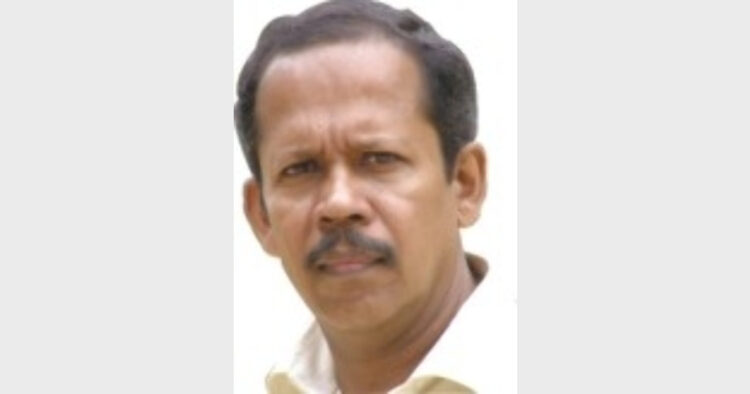INTERVIEW OF THE WEEK
A lawyer by profession Shri Saji Narayan CK is national president of Bharatiya Mazdoor Sangh (BMS). He is a grass roots worker of BMS and held different responsibilities in the organisation including district president, state president, national vice president, etc. Before joining the BMS he was active in ABVP. He also authored 15 law books which are being taught to law students in Kerala. He was incharge of ILO for five years and also a member of the Second National Commission for Labour. Organiser Senior Correspondent Pramod Kumar spoke to him in New Delhi to know the reasons of the nationwide strike observed by central trade unions on February 28. Excerpts:
Many people now have reservations about calling strike in the changing scenario. Why the BMS called for a nationwide strike?
The BMS is of the opinion that when all plans of action fail, the strike is the only resort. Today, the government has no respect for trade unions and their demands. It doesn’t respect the workers, farmers and the common men. It is only for big corporate houses. When Kingfisher suffered a loss, the very next day the Prime Minister assisted Mallya. But he did not speak even a single word for the Air India workers. The government is behaving like deaf and dump.
How do you see the role of trade unions in the era of globalisation and privatisation?
Globalisation has completed two decades in our country. It is right time to take stock of its impact. During the two decades the trade unions have almost not indulged in strikes. It left the impression that the trade unions are not much active. But that is not correct. Since there was a change of circumstances, the trade unions also wanted to cope with the situation. But because of that, a lot of loss took place in the labour sector. Contractulisation increased and unorganised sector too expanded. In 1990, the percentage of unorganised sector was 92 with only eight per cent in organised, but now, according to the Labour Ministry statistics, the urorganised sector expanded to 94 per cent.
In these circumstances the trade unions have an increased role. We have decided that unless we return to our earlier position of being aggressive and take up strike as a weapon to establish the workers’ rights, the situation will not improve. This is the reason all the trade unions came together on November 23 and gave an ultimatum of three months to the government to meet their demands. It is for the first time in the history of labour movement in India that all trade unions came together and conducted a nationwide strike. It shows a change of line of action on the part of the trade unions.
Since the contract labour is increasing, how can you expect such people to join trade union activities?
The history of trade unions in India reveals that it was not the well-settled people who joined the trade unions, but the most exploited one. The contract labour is the most exploited people in organised sector. Both the regular and contract employees do the same job but the contract labour gets low wage for the same work. This is sheer exploitation. It is because of this exploitation they are joining the trade unions in good numbers.
What about the unorganised sector?
India has one of the largest unorganised sectors in Asia. It is the area where trade unions have not entered. It is also not protected by any law. During our Jalgaon conference, we raised two slogans—Organised the Unorganised and March to the Villages. Majority of the unorganised labour is in villages. The trade unions have different roles in unorganised sector as we have to fight against many agencies unlike the one employer in organised sector. We are getting very magnificent results from those areas. We hope to cover a large area of unorganised sector in the coming years.
The issue of Employees Family Pension Scheme is greatly agitating the employees, as they get very few rupees, say less than Rs 300 per month as pension, despite contribution in the scheme. What do you say?
There is very anomalous position. Some people are getting even less than Rs 150 per month. One person in Hyderabad gets only Rs 4 (four) per month. He went to the Union Labour Minister and ‘gifted’ that amount too to him at a public function. The BMS has demanded that minimum pension should be fixed Rs 3000 per month. The PF department has sufficient funds and it can afford it.
What is the organisational strength of BMS now?
BMS is the largest labour union with more than one crore members at present. In the last verification in 2002, the government had accepted the 62.4 lakh membership. The BMS is now leading the entire trade union movement in the country.
It is alleged that during the NDA government the BMS was very active and now under the UPA it prefers to remain silent on most of the issues. Why?
It is wrong. During the NDA regime the media used to flare up even the minor issues. The BMS has always taken the position that whichever be the government, whether it is Congress, communist or the BJP government, the economic and labour policies remain the same. So, whichever government comes, we have to fight for the rights of the labour.
What are the two most vital issues before trade unions today?
Contractulisation in organised sector and the tragic situation of unorganised sector. In the organised sector, the people don’t get proper pay, descent working conditions and social security. In villages, the people of unorganised sector live like cattle. There are still forced and bonded labour in villages. Therefore, the trade unions have to be more aggressive to bring revolutionary change in the society. That can be the only Bharatmata Puja at this point to bring a total change.













Comments